|
|
 |
|
Calanoida ( Order ) |
|
|
|
Calanoidea ( Superfamily ) |
|
|
|
Paracalanidae ( Family ) |
|
|
|
Calocalanus ( Genus ) |
|
|
| |
Calocalanus plumulosus (Claus, 1863) (F,M) | |
| | | | | | | Syn.: | Calanus plumulosus Claus, 1863 (p.174, Descr.F, figs.F);
Leptocalanus plumulosus : Bernard, 1958 a (p.192, figs.M); 1960 (n°36 first revision, p.4, figs.F,M); Paiva, 1963 (p.26, fig.F, Rem.); Mazza, 1966 (p.69);
Ischnocalanus plumulosus : Vervoort, 1963 b (p.115, Rem.); Neto & Paiva, 1966 (p.22, Table III); Fleminger, 1967 a (tabl.1); Corral Estrada, 1970 (p.125, figs.F, juv.M, Rem.); Deevey, 1971 (p.224); Binet & al., 1972 (p.71); Razouls, 1972 (p.94, Annexe: p.24); Corral, 1972 b (n°138, p.5, 6, figs.F, M); Roe, 1972 (p.277, tabl.1, tabl.2); Björnberg, 1973 (p.308, 387); Corral Estrada & Pereiro Muñoz, 1974 (p¿10, tab.I); Deevey & Brooks, 1977 (p.256, tab.2, Station "S"); Dessier, 1979 (p.204); Brenning, 1982 (p.4, Rem.); Vives, 1982 (p.290); Dessier, 1983 (p.89, Tableau 1, Rem., %); Scotto di Carlo & al., 1984 (1044); Kimmerer & al., 1985 (p.427); Brenning, 1985 a (p.28, Table 2); Regner, 1985 (p.24); Lozano Soldevilla & al., 1988 (p.57); Dessier, 1988 (tabl.1); Hirakawa & al., 1990 (tab.3); Suarez & al., 1990 (tab.2); Suarez, 1992 (App.1); Siokou-Frangou, 1997 (tab.1); Gilabert & Moreno, 1998 (tab.1, 2); Mauchline, 1998 (tab.58); Vukanic, 2003 (139, tab.1); Conway & al., 2003 (p.159, figs.F,M, Rem.); Isari & al., 2006 (p.241, tab.II); Zervoudaki & al., 2006 (p.149, Table I); Morales-Ramirez & Suarez-Morales, 2008 (p.518); Zakaria & al., 2016 (p.1, Table 1);
Calocalanus plumosus : Salah & Tamas, 1970 (p.333); Salah, 1971 (p.319); Renon, 1987 (tab.2);
Calocalanus plumulosus s.l. : Brinton & al., 1986 (p.228, Table 1); | | | | Ref.: | | | Giesbrecht, 1892 (p.176, 185, 770, figs.F); T. Scott, 1894 b (p.39, figs.F); Giesbrecht & Schmeil, 1898 (p.26, Rem. F); Wheeler, 1901 (p.170, fig.F, Rem.F); Thompson & Scott, 1903 (p.233, 243); A. Scott, 1909 (p.31, Rem.); Sewell, 1912 (p.353, 360); 1914 a (p.214); Pesta, 1920 (p.502); Früchtl, 1924 b (p.43); Farran, 1929 (p.208, 223); Sewell, 1929 (p.89); Wilson, 1932 a (p.41, fig.F); Rose, 1933 a (p.77, figs.F); Dakin & Colefax, 1933 (p.205); Farran, 1936 a (p.83); Dakin & Colefax, 1940 (p.93); Wilson, 1942 a (p.173, fig.F); Sewell, 1947 (p.54); Tanaka, 1956 c (p.377, figs.F,M); Chiba & al., 1957 a (p.11); Tanaka, 1960 (p.29); Heinrich, 1961 b (p.93); Grice, 1962 (p.189, figs.F, Rem.); Chen & Zhang, 1965 (p.44, figs.F); Vives, 1967 (p.551, fig.F); Chen & Zhang, 1974 (p.108, figs.M); Zheng & al., 1982 (p.24, figs.F); Bradford-Grieve, 1994 (p.61, figs.F,M, fig.99); Chihara & Murano, 1997 (p.750, Pl.71: F,M); Bradford-Grieve & al., 1999 (p.877, 910, figs.F,M); Mulyadi, 2004 (p.179, figs.F, Rem.); Avancini & al., 2006 (p.71, Pl. 40, figs.F,M, Rem.); Vives & Shmeleva, 2007 (p.955, figs.F,M, Rem.); Phukham, 2008 (p.122, figs.F) | 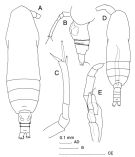 issued from : J.M. Bradford-Grieve in The Marine Fauna of New Zealand: Pelagic Calanoid Copepoda. National Institute of Water and Atmospheric Research (NIWA). New Zealand Oceanographic Institute Memoir, 102, 1994. [p.63, Fig.33]. Female: A, habitus (dorsal); B, last thoracic somite and urosome (lateral left side); C, P5. Male: D, habitus (dorsal); E, P5.
|
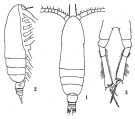 issued from: Q.-c Chen & S.-z. Zhang in Studia Marina Sinica, 1965, 7. [Pl.10, 1-3]. Female (from E China Sea): 1, habitus (dorsal); 2, idem (lateral right side); 3, P5 (posterior).
|
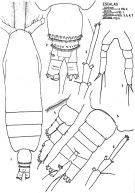 issued from : J. Corral Estrada in Tesis Doct., Univ. Madrid, A-129, Sec. Biologicas, 1970. [Lam.35]. As Ischnocalanus plumulosus. Female (from Canarias Is.): 1, habitus (dorsal); 2, urosome (dorsal); 3, distal segments of A1; 4, P1. Juvenil Male: 5, urosome (dorsal); 6, distal segments of A1. 7, P5 (abnormal or juvenile female) (after C. Razouls).
|
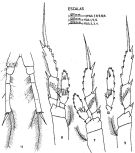 issued from : J. Corral Estrada in Tesis Doct., Univ. Madrid, A-129, Sec. Biologicas, 1970. [Lam.34, figs.7-11]. As Ischnocalanus plumulosus. Female: 7, P2; 8, P3; 9, P4 (without endopod); 10, endopod of P4; 11, P5.
|
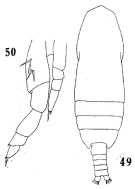 issued from : Q.-c. Chen & S.-z. Zhang in Studia Marina Sinica, 1974, 9. [Pl.5, Figs.49-50]. Male (from South China Sea): 49, habitus (dorsal); 50, P5.
|
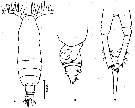 issued from : Z. Zheng, S. Li, S.J. Li & B. Chen in Marine planktonic copepods in Chinese waers. Shanghai Sc. Techn. Press, 1982 [p.25, Fig.12]. Female: a, habitus (dorsal); b, last thoracic segment and urosome (lateral, left side); c, P5. Scale bar in mm.
|
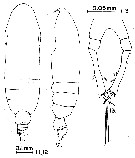 issued from : G.D. Grice in Fish. Bull. Fish and Wildl. Ser., 1962, 61. [p.186, Pl.6, Figs.11-13]. Female (from equatorial Pacific): 11-12, habitus (dorsal and lateral, respectively); 13, P5.
|
 Issued from : W. Giesbrecht in Systematik und Faunistik der Pelagischen Copepoden des Golfes von Neapel und der angrenzenden Meeres-Abschnitte. – Fauna Flora Golf. Neapel, 1892, 19 , Atlas von 54 Tafeln. [Taf.9, Fig.2]. Female: 2, A1 (ventral view).
|
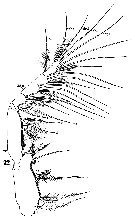 Issued from : W. Giesbrecht in Systematik und Faunistik der Pelagischen Copepoden des Golfes von Neapel und der angrenzenden Meeres-Abschnitte. – Fauna Flora Golf. Neapel, 1892, 19 , Atlas von 54 Tafeln. [Taf.9, Fig.12]. Female: 12, Mxp (posterior view).
|
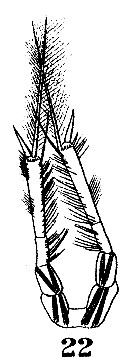 Issued from : W. Giesbrecht in Systematik und Faunistik der Pelagischen Copepoden des Golfes von Neapel und der angrenzenden Meeres-Abschnitte. – Fauna Flora Golf. Neapel, 1892, 19 , Atlas von 54 Tafeln. [Taf.9, Fig.22]. Female: 22, P5.
|
 Issued from : W. Giesbrecht in Systematik und Faunistik der Pelagischen Copepoden des Golfes von Neapel und der angrenzenden Meeres-Abschnitte. – Fauna Flora Golf. Neapel, 1892, 19 , Atlas von 54 Tafeln. [Taf.36, Figs.40, 41]. As Calocalanus plumosus. Female: 40, forehead (lateral); 41, same (dorsal).
|
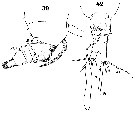 Issued from : W. Giesbrecht in Systematik und Faunistik der Pelagischen Copepoden des Golfes von Neapel und der angrenzenden Meeres-Abschnitte. – Fauna Flora Golf. Neapel, 1892, 19 , Atlas von 54 Tafeln. [Taf.36, Figs.39, 42]. As calocalanus plumosus. Female: 39, posterior part of thoracic segments and urosome (lateral); 42, urosome with spermatophore (ventral). Nota: St = distal seta 1.
|
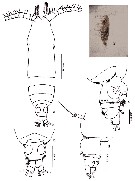 issued from : N. Phukham in Species diversity of calanoid copepods in Thai waters, Andaman Sea (Master of Science, Univ. Bangkok). 2008. [p.204, Fig.78]. Female (from W Malay Peninsula): a, habitus (dorsal); b-c, urosome (dorsal and lateral, respectively); d, last thoracic segment with P5 and urosome r(lateral). Body length after drawing: F = 0.868 mm.
|
 issued from : Mulyadi in Published by Res. Center Biol., Indonesia Inst. Sci. Bogor, 2004. [p.179, Fig.101]. Female (from 07°40'S, 109°00'E): a, habitus (dorsal); b, urosome (dorsal); c, posterior part of last thoracic segment and urosome (lateral left side); d, P5.
|
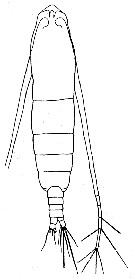 Issued from : M. Bernard in Bull. Soc. Zool. France, 1958, 83. [p.192, Fig.13]. As Leptocalanus plumulosus. Male (from Algiers Bay, Algeria): habitus. Length: 0.522 mm.
|
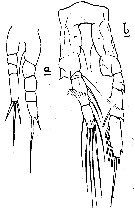 Issued from : M. Bernard in Bull. Soc. Zool. France, 1958, 83. [p.194, Fig. 14, a, b]. As Leptocalanus plumulosus. Male: a, P5; b, P4. Lengths: P5 = 155 µm; P4 = 245 µm.
| | | | | Compl. Ref.: | | | Wolfenden, 1911 (p.203); Massuti Alzamora, 1942 (p.88); Oliveira, 1945 (p.191); Sewell, 1948 (p.323, 357, 391, 395, 407, 412, 414, 422, 433, 436, 439, 442, 456, 460, 463, 469, 477, 489); Yamazi, 1958 (p.148, Rem.); Fagetti, 1962 (p.12); Duran, 1963 (p.14); Heinrich, 1961 (tab.2); Gaudy, 1962 (p.93, Rem.: p.104); V.N. Greze, 1963 a (tabl.2); Shmeleva, 1963 (p.141); Gaudy, 1963 (p.21, Rem.); Björnberg, 1963 (p.30, Rem.); De Decker, 1964 (p.15, 18, 28); De Decker & Mombeck, 1964 (p.11); Grice & Hulsemann, 1965 (p.223); Shmeleva, 1965 b (p.1350, lengths-volume -weight relation); Pavlova, 1966 (p.43); Grice & Hulsemann, 1967 (p.14); De Decker, 1968 (p.45); Delalo, 1968 (p.137); Carli, 1971 (p.372, tab.1); Timonin, 1971 (p.281, trophic group); Apostolopoulou, 1972 (p.338); Carter, 1977 (1978) (p.35); Porumb, 1980 (p.168); Kovalev & Schmeleva, 1982 (p.83); Guangshan & Honglin, 1984 (p.118, tab.); De Decker, 1984 (p.315, 334: carte); Longhurst, 1985 (tab.2); Madhupratap & Haridas, 1986 (p.105, tab.1); M. Lefèvre, 1986 (p.33); Othman & al., 1990 (p.561, 563, Table 1); Yoo, 1991 (tab.1); McKinnon, 1991 (p.471); Hure & Krsinic, 1998 (p.100); Jimenez-Perez & Lara-Lara, 1988; Hattori, 1991 (tab.1, Appendix); Shih & Young, 1995 (p.71); Madhupratap & al., 1996 (p.866); Padmavati & Goswami, 1996 a (p.85, fig.3, Table 4, vertical distribution); Kotani & al., 1996 (tab.2); Padmavati & al., 1998 (p.349); Suarez-Morales & Gasca, 1998 a (p108); Noda & al., 1998 (p.55, Table 3, occurrence); Smith S. & al., 1998 (p.2369, Table 6, moonsoon effects); Lavaniegos & Gonzalez-Navarro, 1999 (p.239, Appx.1); Razouls & al., 2000 (p.343, Appendix); Fernandez-Alamo & al., 2000 (p.1139, Appendix); Madhupratap & al., 2001 (p. 1345, vertical distribution vs. O2, figs.4, 5: clusters); Lo & al., 2001 (1139, tab.I); Shimode & Shirayama, 2004 (tab.2); Hsiao & al., 2004 (p.326, tab.1); Hsieh & al., 2004 (p.397, tab.1, p.399, tab.2); Daly Yahia & al., 2004 (p.366, fig.4); Lan & al., 2004 (p.332, tab.1); Lo & al.*, 2004 (p.218, fig.6); Lo & al., 2004 (p.89, tab.1); Prusova & Smith, 2005 (p.75); Hwang & al., 2006 (p.943, tabl. I); Hwang & al., 2007 (p.23); Dur & al., 2007 (p.197, Table IV); Khelifi-Touhami & al., 2007 (p.327, Table 1); Jitlang & al., 2008 (p.65, Table 1); Ayon & al., 2008 (p.238, Table 4: Peruvian samples); Fernandes, 2008 (p.465, Tabl.2); Lan Y.C. & al., 2008 (p.61, Table 1, % vs stations); Tseng L.-C. & al., 2008 (p.153, Table 2, fig.5, occurrence vs geographic distribution, indicator species); Tseng & al., 2008 (p.402, Table 2); McKinnon & al., 2008 (p.844: Tab.1); C.-Y. Lee & al., 2009 (p.151, Tab.2); Cornils & al., 2010 (p.2076, Table 3); Schnack-Schiel & al., 2010 (p.2064, Table 2: E Atlantic subtropical/tropical); Fazeli & al., 2010 (p.153, Table 1); Mazzocchi & Di Capua, 2010 (p.426); W.-B. Chang & al., 2010 (p.735, Table 2, abundance); Hsiao S.H. & al., 2011 (p.475, Appendix I); Tseng L.-C. & al., 2011 (p.239, Table 3, abundance %); Tseng L.-C. & al., 2011 (p.47, Table 2, occurrences vs mesh sizes); Maiphae & Sa-ardrit, 2011 (p.641, Table 2, 3, Rem.); Pillai H.U.K. & al., 2011 (p.239, Table 3, vertical distribution); Isari & al., 2011 (p.51, Table 2, abundance vs distribution); Selifonova, 2011 a (p.77, Table 1, alien species in Black Sea); Kâ & Hwang, 2011 (p.155, Table 3: occurrence %); Shiganova & al., 2012 (p.61, Table 4); Uysal & Shmeleva, 2012 (p.909, Table I); Tseng & al., 2012 (p.621, Table 3: abundance); Jang M.-C & al., 2012 (p.37, abundance and seasonal distribution); Belmonte & al., 2013 (p.222, Table 2, abundance vs. stations); Cornils & Blanco-Bercial, 2013 (p.861, Table 1, molecular analysis, figs.3, 4, 5); in CalCOFI regional list (MDO, Nov. 2013; M. Ohman, pers. comm.); Tseng & al., 2013 (p.507, seasonal abundance); Lidvanov & al., 2013 (p.290, Table 2, % composition); Hwang & al., 2014 (p.43, Appendix A: seasonal abundance); Mazzocchi & al., 2014 (p.64, Table 4, 5, abundance) ; Benedetti & al., 2016 (p.159, Table I, fig.1, functional characters); El Arraj & al., 2017 (p.272, table 2, spatial distribution); Benedetti & al., 2018 (p.1, Fig.2: ecological functional group); Belmonte, 2018 (p.273, Table I: Italian zones); Chaouadi & Hafferssas, 2018 (p.913, Table II: occurrence); Palomares-Garcia & al., 2018 (p.178, Table 1: occurrence) | | | | NZ: | 19 | | |
|
Distribution map of Calocalanus plumulosus by geographical zones
|
| | | | | | | | | | | | | | |  issued from : A.A. Shmeleva in Bull. Inst. Oceanogr., Monaco, 1965, 65 (n°1351). [Table 6: 11 ]. Calocalanus plumulosus (from South Adriatic). issued from : A.A. Shmeleva in Bull. Inst. Oceanogr., Monaco, 1965, 65 (n°1351). [Table 6: 11 ]. Calocalanus plumulosus (from South Adriatic).
Dimensions, volume and Weight wet. Means for 50-60 specimens. Volume and weight calculated by geometrical method. Assumed that the specific gravity of the Copepod body is equal to 1, then the volume will correspond to the weight. |
| | | | Loc: | | | Cosmopolite (tropical & sub-tropical): sub-Antarct. (Indian), South Africa (E & W), Atlant., Angola (Baia Farta), G. of Guinea, Ivorian shelf, Caribbean Sea, G. of Mexico, Florida, off Bermuda: Station "S" (32°10'N, 64°30'W), Canary Is., Morocco-Mauritania, Moroccan copast, Medit. (Alboran Sea, Sidi Fredj coast, N Tunisia, Banyuls, Marseille, Ligurian Sea, Napoli, Messina, Gulf of Taranto, Adriatic Sea, Ionian Sea, Aegean Sea, Thracian Sea, Lebanon Basin, W Egyptian coast, Alexandria, Black Sea), Red Sea, Gulf of Oman, G. of Aden, Arabian Sea, Maldive Is., Indian, Goa - Gujarat, Sri Lanka, Madras, Bay of Bengal, Nicobar Is., Barren Island, S Burma, W Malay Peninsula (Andaman Sea), G. of Thailand, Indonesia-Malaysia, Cilacap Bay (S Java); SW Celebes, China Seas (Yellow Sea, East China Sea, South China Sea), Kuroshio Current region, Taiwan (S, E, SW, W, N, Mienhua Canyon, NW, NE), S Korea, Korea Strait, Japan (Onagawa, Toyama Bay), off Japan (Kuchinoerabu Is., SE, NE), California, G. of California, La Paz, G. de Tehuantepec, W Costa Rica, off Guatemala W, Clipperton Is., Pacif. ( W equatorial), Australia (Shark Bay, New South Wales, Great Barrier, G. of Carpentaria), New Caledonia, New Zealand, Moorea Is., Peru, Chile
Data from Cornils & Blanco-Bercial (2013): 05°11'S; 143°16'W. | | | | N: | 183 | | | | Lg.: | | | (11) F: 1,083-1,039; (14) F: 1,1; (34) F: 1,05; (35) F: 1,3-1,17; (45) F: 1,25-0,9; (47) F: 1,2-0,93; (55) F: 1,18-1; M: 0,9-0,88; (66) F: 0,92; (73) F: 1,16-1,14; (101) F: 0,87; (188) F: 1,2-0,93; (196) F: 1,2-0,99; M: 0,83; (199) F: 1,22-1,06; (202) F: 0,9-1,2; (237) F: 0,90; (290) F: 1,2-1; (338) M: 0,8-0,65; (449) F: 1,2-0,93; (920) F: 1,04; (991) F: 0,87-1,25; M: 0,83-0,9; (1023) F: 0,93-1,11; (1112) F: 1,25-1,344; (1122) F: 0,95; (1131) M: 0,522; (1132) F: 0,93-1,2; M: 0,83-0,9; {F: 0,87-1,34; M: 0,522-0,90} | | | | Rem.: | epipelagic. Sargasso Sea: 0-500 m (Deevey & Brooks, 1977, Station "S").
Recorded by Björnberg (1963, p.30) for the first time from Brazilian waters. It seems to prefer oceanic waters and cooler temperatures.
Timonin (1971, p.282) considers the trophic interrelations in the equatorial and tropical Indian Ocean, and divides the plankters into 6 trophic groups from the litterature and the results of studies of mouth-parts structure and intestine content. This species is a fine-filter feeder.
After Benedetti & al. (2018, p.1, Fig.2) this species belonging to the functional group 7 corresponding to small filter feeding herbivorous.
See in DVP Conway & al., 2003 (version 1) | | | Last update : 25/10/2022 | |
|
|
 Any use of this site for a publication will be mentioned with the following reference : Any use of this site for a publication will be mentioned with the following reference :
Razouls C., Desreumaux N., Kouwenberg J. and de Bovée F., 2005-2026. - Biodiversity of Marine Planktonic Copepods (morphology, geographical distribution and biological data). Sorbonne University, CNRS. Available at http://copepodes.obs-banyuls.fr/en [Accessed January 08, 2026] © copyright 2005-2026 Sorbonne University, CNRS
|
|
 |
 |



















